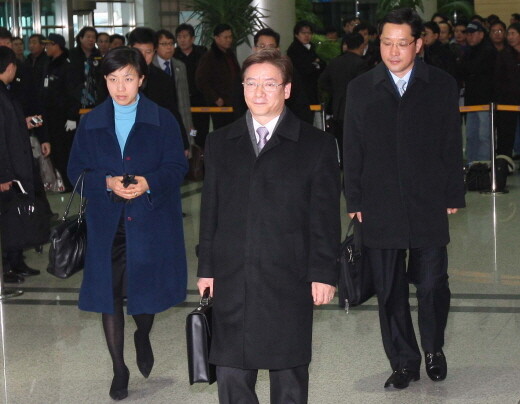hankyoreh
Links to other country sites 다른 나라 사이트 링크
President Lee showing increasing flexibility on inter-Korean summit agenda

For an inter-Korean summit to take place, the two Koreas need to agree on the three issues of the agenda, time and place. What is noteworthy is that since the second half of last year in interviews with the BBC and CNN, President Lee Myung-bak has shown an increasingly flexible attitude towards these points of contention as time passes.
In November of last year, President Lee said in an address to the nation that he is flexible enough regarding a summit venue that it need not necessarily be held in Seoul. This means he would not refuse a third summit if it were to be held in Pyongyang, as was the case in 2000 and 2007. However, as discussions over the Kaesong Industrial Complex and Mt. Kumgang tourism are currently taking place, a core Cheong Wa Dae (the presidential office in South Korea or Blue House) official said that if Kim Jong-il does not come to Seoul, neither Kaesong nor Mt. Kumgang have any particular meaning.
In regards to the timing of a possible summit, the Cheong Wa Dae also said it would not make a great deal of difference if it took place before or after the June 2 regional elections. Cheong Wa Dae spokesman Park Sun-kyoo said in a briefing Monday that time and conditions are not important.
The real issue is the agenda. Since the Cheong Wa Dae has said it would not hold a meeting for the sake of meeting, but that there must be results, the presidential office is maintaining the policy line of making the North Korea nuclear issue and the POW and abductee issues key agenda items for the summit.
During unofficial contacts that have been held on several occasions with North Korea since last October, South Korea has requested the repatriation of a set number of POWs and abuctees, while North Korea has shown reservations. Some are saying that the excavation of South Korean soldiers killed during the war, which was mentioned by President Lee in his New Year’s address on Jan. 4, could be the key to a compromise.
The key agenda item is still the nuclear issue. In an interview with CNN on Jan. 30, Lee said he thinks the time is approaching for North Korea to finally issue a response over whether it plans to give up its nuclear program, and that he believes he could discuss his proposed “Grand Bargain” with North Korea. A government official stressed that North Korea cannot merely verbally express its will to denuclearize, but rather substantive steps must come out following negotiations. It is particularly noteworthy that in recent interviews with the BBC and CNN, President Lee said that he “does not think a North Korean collapse is imminent” and “if North Korea makes a strategic decision to completely give up its nuclear weapons and programs, it would receive many benefits.” This is apparently the message President Lee is sending, an offer to North Korea to directly trade its nuclear program for economic aid and security guarantees.
Please direct questions or comments to [englishhani@hani.co.kr]
Editorial・opinion
![[Column] Is Korean democracy really regressing? [Column] Is Korean democracy really regressing?](https://flexible.img.hani.co.kr/flexible/normal/500/300/imgdb/original/2024/0705/2917201664129137.jpg) [Column] Is Korean democracy really regressing?
[Column] Is Korean democracy really regressing?![[Column] How tragedy pervades weak links in Korean labor [Column] How tragedy pervades weak links in Korean labor](https://flexible.img.hani.co.kr/flexible/normal/500/300/imgdb/original/2024/0703/8717199957128458.jpg) [Column] How tragedy pervades weak links in Korean labor
[Column] How tragedy pervades weak links in Korean labor- [Column] How opposing war became a far-right policy
- [Editorial] Korea needs to adjust diplomatic course in preparation for a Trump comeback
- [Editorial] Silence won’t save Yoon
- [Column] The miscalculations that started the Korean War mustn’t be repeated
- [Correspondent’s column] China-Europe relations tested once more by EV war
- [Correspondent’s column] Who really created the new ‘axis of evil’?
- [Editorial] Exploiting foreign domestic workers won’t solve Korea’s birth rate problem
- [Column] Kim and Putin’s new world order
Most viewed articles
- 110 days of torture: Korean mental patient’s restraints only removed after death
- 2Months after outcry over “torture devices,” Justice Ministry proposes more restraints for immigratio
- 3Beleaguered economy could stymie Japan’s efforts to buoy the yen
- 4[Column] Is Korean democracy really regressing?
- 5Koreans are getting taller, but half of Korean men are now considered obese
- 6[Column] How tragedy pervades weak links in Korean labor
- 7Former bodyguard’s dark tale of marriage to Samsung royalty
- 8Real-life heroes of “A Taxi Driver” pass away without having reunited
- 9[Editorial] Exploiting foreign domestic workers won’t solve Korea’s birth rate problem
- 10Democrats ride wave of 1M signature petition for Yoon to be impeached